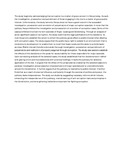| dc.description.abstract | The study begins by acknowledging that corruption is a matter of grave concern in Kenya
today. As such, the investigation, prosecution and punishment of those engaging in the
vice is a matter of grave public interest. Unfortunately, the study laments, Kenya does not
have a good record in the successful investigation, prosecution and conviction of
perpetrators of major corruption scandals.
It notes that the judiciary has prohibited the investigation and prosecution of a number of
corruption cases. Some of the cases prohibited involved the twin scandals of Anglo-
Leasing and Goldenberg. Through an analysis of seven significant cases on corruption,
the study examines the legal justifications of the decisions. Its main focus is to establish
the extent to which the judiciary gives effect to public interest when dealing with
corruption cases. The study argues that the public has a right to subsist in an environment
that is conducive to development to enable them to meet their basic needs and the state to
provide basic services. Public interest therefore demands thorough investigation,
prosecution and punishment of perpetrators and restitution of property acquired through
corruption. The study also seeks to establish the effects of the decisions on the quest for
accountability for those responsible for major scandals.
Upon conducting analysis of the selected cases, the study established that the decisions
were riddled with glaring errors and inconsistencies with previous holdings. It faults the
judiciary for selective application of the law. It argues that the effect of the jurisprudence
created by the selected cases is to paralyze investigation and prosecution of perpetrators
of major scandals and to unconstitutionally amend the Constitution. It further argues that
the judiciary is insensitive to public interest. It further finds that as a result of external
influence, particularly through the exercise of politics and power, the judiciary lacks
independence. The study concludes by suggesting necessary reforms which include;
enhancing the independence of the judiciary, mainstreaming of anti-corruption laws and
principles in the Constitution, and strengthening institutions important for fighting
corruption. | en |


